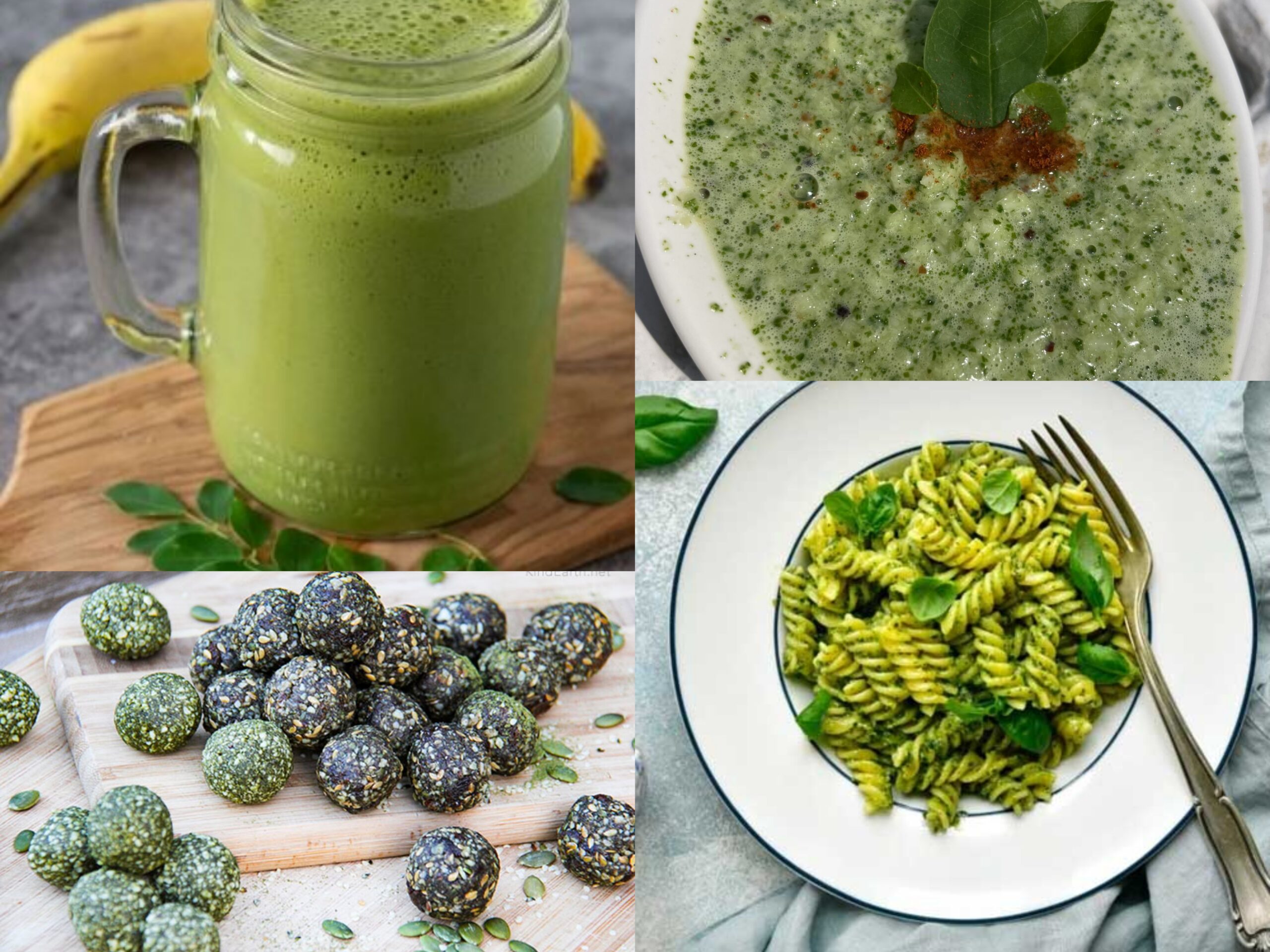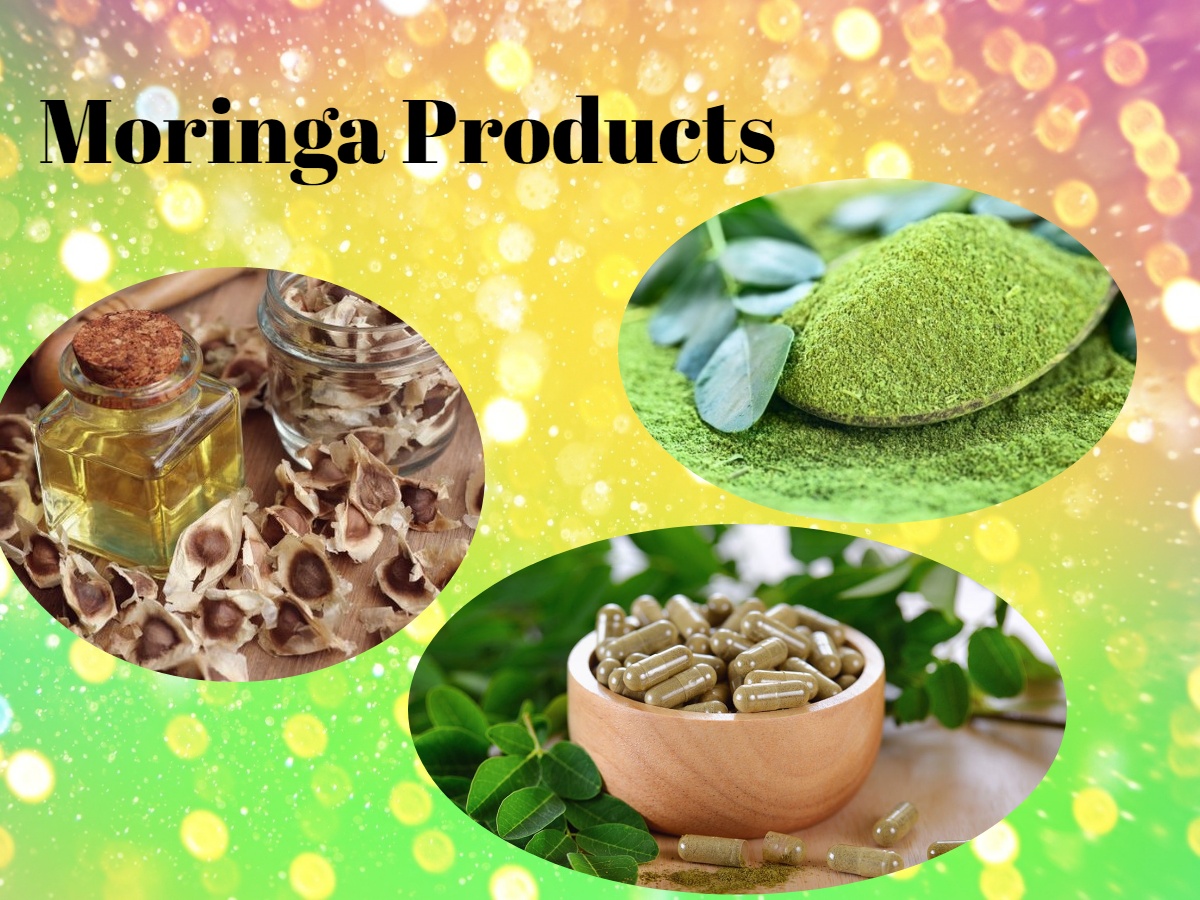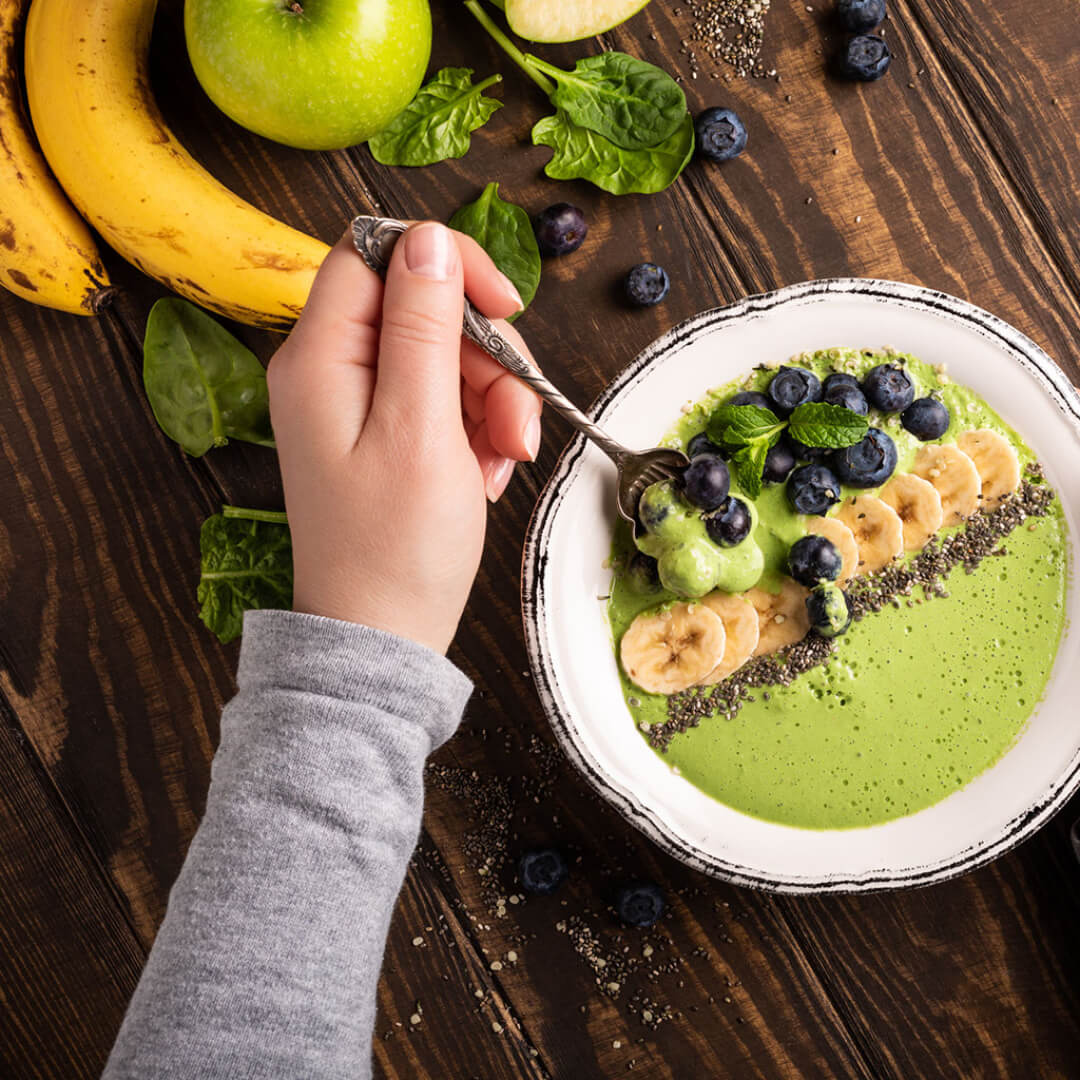Balanced diet! If you are thinking of it, you can include moringa (leaves or powder) as it is a powerhouse of nutrition. Furthermore, moringa is a culinary gem with a rich history in various cuisines worldwide.
Packed with essential vitamins, minerals, and antioxidants, moringa is a superfood and a versatile ingredient that can be incorporated into a wide range of dishes.
From savory meals to sweet treats, let’s delve into the diverse culinary landscape of moringa with these enticing recipes.
Our Contents:
1. Moringa Banana Smoothie

Ingredients:
- 1 ripe banana
- 1/2 cup fresh moringa leaves or 1 teaspoon moringa powder
- 1/2 cup spinach leaves
- 1/2 cup plain Greek yogurt
- 1/2 cup almond milk (or any milk of your choice)
- 1 tablespoon honey (optional)
- Ice cubes
Instructions:
- In a blender, combine banana, moringa leaves/powder, spinach, Greek yogurt, almond milk, and honey (if using).
- Blend until smooth and creamy.
- Add ice cubes and blend again until desired consistency is reached.
- Pour into glasses and serve immediately.
2. Moringa Energy Balls
Ingredients:
- 1 cup rolled oats
- 1/2 cup almond butter
- 1/4 cup honey
- 1/4 cup shredded coconut
- 1/4 cup chopped nuts (such as almonds or walnuts)
- 1/4 cup dried cranberries
- 2 tablespoons moringa powder
- 1 teaspoon vanilla extract

Instructions:
- In a large bowl, combine rolled oats, almond butter, honey, shredded coconut, chopped nuts, dried cranberries, moringa powder, and vanilla extract.
- Mix until well combined and the mixture holds together.
- Roll the mixture into small balls using your hands.
- Place the energy balls on a baking sheet lined with parchment paper.
- Chill in the refrigerator for at least 30 minutes before serving.
3. Moringa Coconut Curry

Ingredients:
- 1 tablespoon coconut oil
- 1 onion, chopped
- 2 cloves garlic, minced
- 1 tablespoon grated ginger
- 2 tablespoons curry powder
- 1 teaspoon ground turmeric
- 1 can (400ml) coconut milk
- 2 cups chopped vegetables (such as carrots, bell peppers, and cauliflower)
- 1 cup cooked chickpeas
- 1 cup fresh moringa leaves or 1 tablespoon moringa powder
- Salt and pepper to taste
- Cooked rice for serving
Instructions:
- Heat coconut oil in a large skillet over medium heat. Add onion, garlic, and ginger. Sauté until fragrant and onions are translucent.
- Stir in curry powder and turmeric, cooking for another minute.
- Pour in coconut milk and bring to a simmer.
- Add chopped vegetables and chickpeas. Cook until vegetables are tender, about 10-15 minutes.
- Stir in moringa leaves and cook for an additional 2-3 minutes until wilted.
- Season with salt and pepper to taste.
- Serve hot with cooked rice.
4. Moringa Pesto Pasta
Ingredients:
- 2 cups fresh basil leaves
- 1/2 cup moringa leaves or 1 teaspoon moringa powder
- 1/2 cup grated Parmesan cheese
- 1/3 cup pine nuts
- 2 cloves garlic
- 1/2 cup extra-virgin olive oil
- Salt and pepper to taste
- Cooked pasta of your choice

Instructions:
- In a food processor, combine basil, moringa leaves/powder, Parmesan cheese, pine nuts, and garlic. Pulse until finely chopped.
- With the processor running, slowly drizzle in the olive oil until the mixture forms a smooth paste.
- Season with salt and pepper to taste.
- Toss the pesto with cooked pasta until evenly coated.
- Serve hot and garnish with extra Parmesan cheese if desired.
Advantages of Moringa in a Balanced Diet
Incorporating moringa into a balanced diet offers a plethora of advantages, enhancing overall health and well-being. Here are several benefits of including moringa in your daily meals:
1. Rich Nutritional Profile:
- Moringa leaves are packed with essential nutrients, including vitamins (A, C, E, K), minerals (calcium, magnesium, potassium), protein, and antioxidants.
- Adding moringa to your diet provides a significant boost of these nutrients, supporting various bodily functions and promoting overall health.
2. Supports Immune Function:
- Moringa is renowned for its immune-boosting properties due to its high vitamin C content and antioxidant activity.
- Regular consumption of moringa can help strengthen the immune system, making the body more resilient to infections and illnesses.
3. Enhances Energy Levels:
- Moringa is a natural energy booster, thanks to its rich nutrient content and ability to combat fatigue.
- Including moringa in your diet can help alleviate feelings of tiredness and increase overall energy levels, promoting vitality and productivity throughout the day.
4. Promotes Digestive Health:
- Moringa contains fiber, which plays a crucial role in supporting digestive health.
- Fiber helps regulate bowel movements, prevents constipation, and promotes a healthy gut microbiome.
- Incorporating moringa into your diet can aid in digestion and promote overall gastrointestinal wellness.
5. Supports Heart Health:
- Moringa has been shown to have cardiovascular benefits, including reducing cholesterol levels and regulating blood pressure.
- The antioxidants present in moringa help protect against oxidative damage to the heart and blood vessels, lowering the risk of heart disease and stroke.
6. Aids in Weight Management:
- Moringa can be a valuable addition to a weight management plan due to its low-calorie and high-nutrient content.
- Its fiber content helps promote feelings of fullness, reducing appetite and preventing overeating.
- Additionally, moringa’s ability to boost energy levels can support physical activity and calorie expenditure.
7. Anti-inflammatory Properties:
- Moringa possesses potent anti-inflammatory properties, attributed to its bioactive compounds such as flavonoids and phenolic acids.
- Consuming moringa may help reduce inflammation in the body, alleviating symptoms of chronic inflammatory conditions such as arthritis and promoting overall joint health.
8. Supports Healthy Skin and Hair:
- Moringa’s antioxidant properties contribute to healthy skin and hair by protecting against oxidative stress and damage from free radicals.
- Additionally, moringa contains nutrients like vitamin E and zinc, which promote skin regeneration, collagen production, and hair growth.
9. Enhances Brain Health:
- Moringa contains compounds that have neuroprotective effects and may help improve cognitive function and memory.
- Regular consumption of moringa may support brain health and reduce the risk of age-related cognitive decline.
10. Sustainable and Easily Accessible:
- Moringa trees are hardy and drought-resistant, thriving in various climates and soil conditions.
- They are also fast-growing and can be cultivated in both tropical and subtropical regions.
- As a readily available and sustainable source of nutrition, moringa offers an accessible solution to address malnutrition and food insecurity in many parts of the world.

In conclusion, integrating moringa or moringa powder into a balanced diet can offer numerous health benefits, ranging from improved immunity and digestion to enhanced energy levels and heart health.
With its rich nutritional profile and versatile culinary applications, moringa serves as a valuable addition to any healthy eating regimen.










